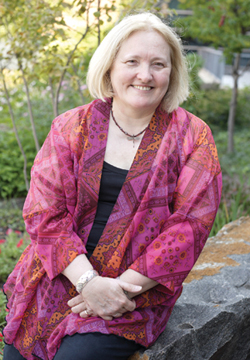Cancer survivorship program helps patients live life to its fullest

Mary Donohue never expected to live to see the age of 60, let alone look forward to it.
The Brandywine Hundred resident, who just turned 60, has battled chronic lymphocytic leukemia, breast cancer and other health issues for more than 27 years. During that time, the wife, mother and writer has had to endure a compromised immune system, swollen glands, chronic bronchitis, a splenectomy, countless doctor visits, invasive procedures, treatments and other forms of therapy to keep her cancer in check. And although her blood counts remain stable, she’s just a cold or infection away from getting very sick again.
It’s not surprising that Mary’s health challenges take a toll on her emotionally.
“I woke up one morning and realized that there was something lacking in my life,” she explains. “Although I was in relatively good health, I was still having trouble functioning day to day. I was always fatigued, and the cancer was always weighing on my mind. I just felt like I was going through the motions.”
A local chapter of The Leukemia & Lymphoma Society recommended she visit the Survivorship Multidisciplinary Center at the Helen F. Graham Cancer Center and check out its nationally recognized survivorship program. Established in 2006, the program has touched the lives of more than 1,000 survivors and is the only program of its kind in the country. The innovation of this program has been recognized in nine professional publications over the past few years.
Led by Scott Siegel, Ph.D., this Cancer Survivorship Program consists of the Survivorship Multidisciplinary Clinic, the Survivorship Workbook and Survivorship Educational Seminars. “Our program helps survivors with the psychosocial issues they face after cancer by focusing on the physical, psychological, social and spiritual changes in their lives,” says Siegel. “It is having a substantial impact on the lives of post-treatment cancer patients. The comprehensive program empowers patients to develop knowledge and skills necessary to move forward.”
“Scott and everyone at the cancer center were wonderful,” says Mary. “He said, ‘You’re worn out always living with the specter of cancer’ and no one had ever really explained things to me like that. It really
validated my feelings and helped me to realize that I have every right to feel tired, anxious or depressed.”
Most of all, the Cancer Survivorship Program helped Mary Donohue learn to live life to the fullest-knowing that it’s all right to live life within her own limitations.
About the Cancer Survivorship program
The Helen F. Graham Cancer Center created the Survivorship Multidisciplinary Center because it recognized cancer survivorship as a distinct phase of cancer care. The cancer team helps patients redefine their lives following treatment, providing them with the combined expertise of a psychologist, a clinical nurse specialist and an oncologic social worker in a single visit after their treatment ends.